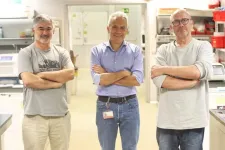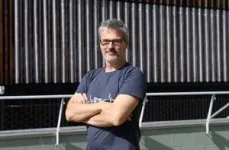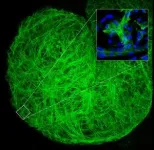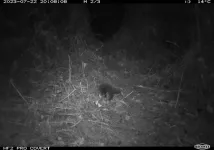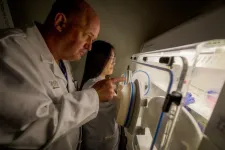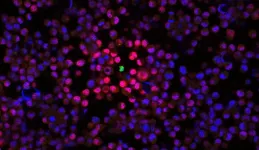CNIC scientists identify the crucial role of the protein neuregulin-1 in heart development
Neuregulin-1 (Nrg1) plays an essential role in the transformation of the heart from its delicate primordial structure into the powerful beating mature organ
2023-11-10
(Press-News.org)
In a study published in the journal Circulation Research, researchers at the Centro Nacional de Investigaciones Cardiovasculares (CNIC) led by Dr. José Luis de la Pompa reveal the essential role of the protein neuregulin-1 (Nrg1) in the intricate transformation of the heart from its delicate primordial structure into a powerful pumping organ.
The findings not only highlight the pathways through which the human heart forms, but also suggest important directions for future medical advances. Commenting on the study, Dr. de la Pompa, head of the Intercellular Signalling in Cardiovascular Development and Disease laboratory at the CNIC, said, “Understanding these fundamental processes takes scientists a step closer to unraveling the mysteries of the human heart and devising strategies to promote better heart health.”
The heart is the body’s engine and is composed of a number of specialized parts. One of these essential components is the ventricles, the heart chambers whose muscular contractions make the ‘lub’ and ‘dub’ sounds of the heartbeat and are responsible for pumping blood to the lungs and around the body throughout life.
Scientists have long been fascinated by how these chambers, initially structured in delicate protrusions called trabeculae, grow and mature into the robust structures that keep the heart beating.
Trabeculae: the heart’s blueprint
Study first author Joaquín Grego-Bessa explained that trabeculae can be likened to a scaffolding that supports the heart as it grows: “We can think of trabeculae as small, primitive projections that form the foundation of the heart.” Understanding how these structures develop into the mature ventricles is not just a fascinating biological question; it also has immense potential to advance regenerative medicine, offering new perspectives on heart conditions and their treatment.
The new study identifies a crucial actor in this process: Nrg1, a signalling protein that guides the trabeculae formation. Nevertheless, mystery still surrounded the intricate mechanisms through which Nrg1 operates and its role in the maturation of the heart wall.
To resolve this mystery, the CNIC team carried out experiments using advanced imaging techniques, genetic analysis, and biochemical studies in mice. Manipulation of the amount of Nrg1 expressed in cardiac cells revealed fascinating patterns.
“The experiments revealed that Nrg1 orchestrates a symphony of events within cardiac cells,” explained Donal MacGrogan, joint lead author on the study. Through these actions, he continued, “Nrg1 coordinates the division of cardiac cells to form trabeculae, ensuring that these structures grow in the appropriate orientation.”
The scientists view Nrg1 as the guiding hand that molds the architecture of the heart. Commenting on the results, Donal MacGrogan said that “when Nrg1 levels were altered, the cardiac cells changed their behaviour, and this resulted in structural and functional irregularities. These changes are like a stumbling block in the growth of the heart, potentially leading to cardiac problems in affected individuals in the future.”
José Luis de la Pompa emphasized that understanding how Nrg1 functions is more than an intellectual exercise and “could provide a route to revolutionary treatments in the future. Decoding the language of heart development could unblock new strategies for the repair of cardiac injury. This research not only deepens our understanding of how the heart grows and functions, but also provides hope for those engaged in the fight against heart diseases.”
The study was supported by the Ministerio de Ciencia e Innovación, CIBER CV, Fundación BBVA, Fundació La Marató de TV3, the Spanish Society of Cardiology, and the Comunidad de Madrid Talent Attraction Program.
The Centro Nacional de Investigaciones Cardiovasculares (CNIC), directed by Dr. Valentín Fuster, is dedicated to cardiovascular research and the translation of knowledge gained into real benefits for patients. The CNIC has been recognized by the Spanish government as a Severo Ochoa center of excellence (award number CEX2020-001041-S, funded by MICIN/AEI/10.13039/501100011033). The center is financed through a pioneering public-private partnership between the government (through the Carlos III Institute of Health) and the Pro-CNIC Foundation, which brings together 12 of the most important Spanish private companies.
END
ELSE PRESS RELEASES FROM THIS DATE:
2023-11-10
Students who feel they have been victimized because of social characteristics such as their ethnicity or their sexuality are at additional risk of trauma, a new national US study has revealed.
Published in the peer-reviewed Journal of School Violence, the research, of more than 2,200 young victims of bullying, found students reported that their physical health; self-esteem; social relationships, and schoolwork suffered more if they felt bias was behind the perpetrators’ actions.
This was particularly ...
2023-11-10
The study, supported by the British Heart Foundation (BHF) and published in the European Heart Journal, is the first to assess how different movement patterns throughout the 24-hour day are linked to heart health. It is the first evidence to emerge from the international Prospective Physical Activity, Sitting and Sleep (ProPASS) consortium.
Cardiovascular disease, which refers to all diseases of the heart and circulation, is the number one cause of mortality globally. In 2021, it was responsible for one in three ...
2023-11-10
Never being visited by friends or family is associated with an increased risk of dying, according to a study published in BMC Medicine. The authors suggest that their findings could be used to help identify patients at a higher risk of dying due to social factors, and to develop more effective interventions to combat the increased risk of death associated with social isolation.
Although previous research has identified associations between deaths due to any causes and both a ‘sense of loneliness’ and living alone, the combined impacts of different types of social interaction ...
2023-11-10
Lisbon, Portugal: Patients with breast cancer in conflict zones around the world are being “massively under-served” by governments, UN aid agencies and other non-governmental organisations (NGOs), Professor Richard Sullivan told the Advanced Breast Cancer Seventh International Consensus Conference (ABC 7). [1]
Among people fleeing conflict zones, either displaced within their own country or across borders to other countries, patients with breast cancer are the “single largest group of cancer patients that present to UN agencies and international NGOs,” said Prof. Sullivan, who is director of the Institute of Cancer Policy and co-director of the Centre for ...
2023-11-10
Is the US reporting system for vaccine safety broken?
Investigation raises concerns that the system is not operating as intended and signals are being missed
A US reporting system designed to detect potential safety issues with vaccines is supposed to be user-friendly, responsive, and transparent. But an investigation published by The BMJ today finds it’s not meeting its own standards.
The Vaccine Adverse Event Reporting System (VAERS), co-managed by the US Centers for Disease Control and Prevention (CDC) and the Food and Drug Administration (FDA), collects reports of symptoms, ...
2023-11-10
Gut bacteria protects against diarrhoeal disease
Peer reviewed - Systematic review – people and animals
The severity of a diarrhoeal disease could be down to the bacteria in your gut – according to new research from the University of East Anglia.
Cryptosporidiosis is responsible for over 100,000 deaths annually – predominantly in children under five.
It also affects animals, and a new study published today shows that large animals – including primates - with less different ...
2023-11-10
A long-beaked echidna named after Sir David Attenborough and last seen by scientists in 1961 has been photographed for the first time in an Indonesian tropical forest.
An international team of researchers worked with local communities to deploy over 80 camera traps to film the elusive animal.
Besides rediscovering the echidna, the team uncovered a wealth of species completely new to science, including beetles, spiders, and a remarkable tree-dwelling shrimp.
A wide range of images and video footage from the expedition are available (see link below).
More than sixty years after it was last recorded, an expedition ...
2023-11-10
A panel of international experts representing the World Health Organization’s Guideline Development Group has updated its guidance on treatments for patients with covid-19.
The new recommendations published by The BMJ are part of a living guideline, developed by the World Health Organization with the methodological support of MAGIC Evidence Ecosystem Foundation, to provide up to date, trustworthy guidance on the management of covid-19 and help doctors make better decisions with their patients.
The guidance ...
2023-11-10
A four-year, $2.6 million grant to study circadian rhythm and novel therapies to protect the heart during a heart attack or cardiac surgery has been awarded to UTHealth Houston by the National Heart, Lung, and Blood Institute, part of the National Institutes of Health.
Principal investigator Holger Eltzschig, MD, PhD, professor, and co-investigator Wei Ruan, MD, PhD, assistant professor, from the Department of Anesthesiology, Critical Care and Pain Medicine at McGovern Medical School at UTHealth Houston, are studying translational, pharmacologic, and interventional strategies targeting ...
2023-11-10
The immune system is a crucial part of our survival, regularly fending off wide-ranging attacks on the body, both internal and external. Unsurprisingly, the elegant defense system that protects us from viruses, bacterial infections, cancer, and other threats is immensely complicated. Each time it mounts a response, it must quickly and carefully orchestrate communication across vast numbers of cells and molecules.
Jennifer Oyler-Yaniv is working to figure out how, exactly, the immune system does this — and when and why it fails.
“There's always the next question, the next ...
LAST 30 PRESS RELEASES:
[Press-News.org] CNIC scientists identify the crucial role of the protein neuregulin-1 in heart development
Neuregulin-1 (Nrg1) plays an essential role in the transformation of the heart from its delicate primordial structure into the powerful beating mature organ
